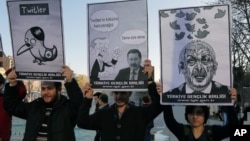A U.S.-based rights group is expressing concern over Turkish government pressure on social media users. Human Rights Watch released its annual report on Thursday as Turkish Twitter users who are criticizing the government face threats and jail.
Professor Hassan Herekan's humorous tweet, making fun of a historically-dressed guard of honor for the Turkish president, resulted in a tirade of attacks, including death threats, against him and his family.
"Oh, what swearing; so many threats against my mother, and the rest of my family," he said, adding that he believes that the perpetrators "are being directed by some other people."
Herekan eventually quit his prestigious university job. The scale and ferocity of the attacks have resulted in accusations that the ruling AK Party is behind them, a charge it denies.
But Professor Yaman Akdeniz of Istanbul’s Bilgi University, an expert on cyber freedom, said suspicion of a government-linked, so-called "troll" army is growing.
"There are allegations that the AKP has its own army of trolls, employed by them," said Akdeniz. "I have seen some studies to suggest that there are connections to the government. Yes, it may be government sponsored."
But it is not only the wrath of "trolls" that tweeters face. There is also the risk of jail.
Well-known TV presenter Sedef Kadas tweeted pictures of judges and prosecutors with the message "remember these people," after they controversially ended an inquiry into high-level government corruption. The response, as she explained, was a knock on the door.
She said three police came to her home in the morning, searched it and confiscated her cell phone, laptop even her son’s iPad. And she was taken to the prosecutor's office.
Kadas said she was charged with "targeting the people who carry out a fight against terrorism."
She called the charge "ridiculous." She said she always applauded people who fight against terror, but her criticism was "about the lack of investigation into people involved in corruption, theft and bribery," a reference to police probes into high-level government graft in December 2013.
The probes ended with the investigators either fired or reassigned, and the government insisting the allegations were part of plot to overthrow it.
In its report, HRW strongly criticized Turkey for its crackdown on social media.
HRW senior Turkey researcher, Emma Sinclair Webb, said with social media playing a key role in keeping graft allegations alive, prosecution of people like Kadas is part of a government campaign to silence debate.
Webb said Kadas basically "faces up to five years in prison."
"But the government seems intent in using this as a way of muzzling speech and spent the whole year on going after people over reports on the corruption, discussions on social media about corruption," Webb added. "This has had a very chilling effect. Now the government wants to change the Internet law, to basically be able to close a website within four hours, without court or judicial oversight."
Last year saw protests against Turkey's government when it tried to impose similar controls on the Internet. That law was eventually overturned by the constitutional court. But with a general election scheduled for June, observers say the government could well be calculating the new law would not be annulled until after the polls, giving the ruling party an advantage by silencing opposition.




